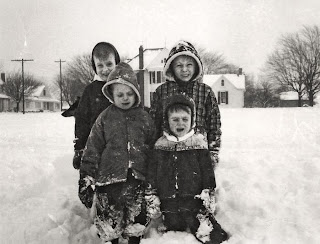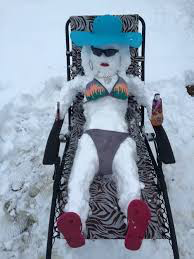We Floridians can deal with weather. Ninety-eight degrees? No problem. The pool boy’s got the deck all ready. Hurricanes? Let’s have a few people over for dancing and umbrella drinks. Savage lightning storms? Gas up the generator, Lucy, there’s a big game on TV tonight. It’s all good, we’re smug and adaptable. Just don’t let the temperature drop below thirty. Less than 25, it’s the Apocalypse.
For only the second time in 37 years, local temperatures around here danced with 20 degrees on Christmas Week. Everybody wanted in on the lowest, as if it was a badge of honor to be the coldest. “It was 19 at my house,” claimed a Flemington woman on a morning when everyone else registered 25. “It was only 15 at my sister’s place in Lake City,” boasted a proud Ocala temp-dropper. People pulled out forty-year-old mittens, Russian Gulag hats and all the boots in the closet. Meanwhile, it was 10 degrees at my sister’s place in New Hampshire and she was out roller-skating and sniffing the daffodils. I think we’re spoiled. You want cold? This is cold:
Talk of your cold! Through the parka’s fold it stabbed like a driven nail.
If our eyes we’d close, then the lashes froze till sometimes we couldn’t see.
It wasn’t much fun but the only one to whimper was Sam McGee.”
Sam, of course, was a Southerner. At minus 20, at least he had a good excuse.
The Winter Of My Discontent
Well, almost. In November of 1962, harshly evicted from my free Austin housing and dead broke, I was forced to accept a $5-a-month residence on a friend’s screened-in back porch. The screens were surrounded by thin black polyethylene to keep out the wind but some nights temperatures fell to the low thirties, requiring all manner and make of borrowed blankets to keep out the cold. One frigid night I took home a flirtatious young lass I met at a backyard bonfire and she was astonished at the dearth of amenities. “You’re kidding!” she said, slackjawed. “There won’t be any clothes coming off THIS girl!” It’s amazing what you can accomplish with a little ingenuity, though. Already a member of the exclusive Mile High Club, this lucky woman now entered the Subfreezing Sisterhood. “I would call this a new low in my dating history,” she remarked, throwing on her parka. “Call me someday when you get electricity.”
Even if you were destitute and scruffy, being on the staff of Gilbert Shelton’s Texas Ranger gave you instant heft in Austin. Women batted their eyes, chatted you up in bars, at parties. The trouble was that almost all of them lived in some form of communal housing….dorms, sororities, curfewed apartments approved by the university….so you weren’t going to their homes for after-hours pursuits. Except for Greta Gotlicks, of course. Greta was a very large woman of considerable means who had her own place in the country. She showed up at all the Wednesday evening folksings at the University of Texas student union, invariably singing a sad tale of woe called Barbara Allen. If there was some form of intermission at these gatherings, Greta’s number set off the alarm and the bathrooms filled up.
Now, most women have their own means of enticing the rabid male gender. Some tilt their heads, lift a glass to their lips and deliver a smoky pout. Others let a sleeve fall off a naked shoulder, or undulate across the room with unmistakable intentions or spill a little champagne on your brogans. Greta, knowing my desperate circumstances, carried a large photograph of a fireplace, which she would flash often in my direction. There is something to be said for scenes of chestnuts roasting on an open fire when Jack Frost is nipping at your nose, but I’m proud to say I resisted the advances of this amateur harlot even though she was the only heated game in town. I have to admit I thought about it, though. In “the cursed cold when it’s got right hold till I’m chilled clean through to the bone,” you need all the insulation you can get.
Chillin’
When we were kids, there were three epic annual events; a trip to Salisbury Beach, our birthdays and Christmas. Better make that four. There was occasionally the often-unexpected, awe-inspiring bolt from the blue called the Snow Day. Alice and I would huddle around the radio avidly incorporating all the information about school cancellations in unimportant places like Rowley, North Reading and some unheard of hell called Dracut, but Lawrence never came up early, as if to torture the young denizens of the largest town in the area. Deeply chagrined, we would ask our Mother how these school board savages could expect mere children to venture out in such outrageous weather; what about health concerns….what about the possibility of your tongue sticking to some flagpole? A person could slip and fall on his head, what about that?
Most of the time, the board would deliver a last minute reprieve, shutting down the classrooms for the day. What seemed like a torturous prospect, dealing with biting winds and streets cluttered with knee-deep precipitation now didn’t look so bad. Mittens were pulled on, snowshoes buckled, three layers of clothing donned and earmuffs set in place. Amidst whooping and hollering, we blasted open the doors and slogged through the snowy wilderness, carrying sleds and fort-building shovels, hoping there was wet stuff among the powder for making snowballs. Our earlobes pulsed, our nosehair froze, our fingers and toes numbed, but nobody yielded. It was our once (or twice, or three times) a year day, full of adventure and anticipation, marked by the wisdom of someone named Mary Beynon Lyons Ray: “We have only this moment, sparkling like a star in our hand and melting like a snowflake. Let us use it before it is too late.”
With the gusto that only small children can bring to bear, we happily took Mary Ray’s advice.
The Iceman Cometh
“When you’re Hof, you’re hot!”---Jerry Reed
You’re not really cold, you just think you are. You would not, for instance, even think of running a marathon barefoot and in shorts at the Arctic Circle because you fear you’d freeze to death. Wim Hof of Finland, who did just that, deigns to disagree. Hof, now better known as “The Iceman,” was nervous himself at the prospect of running 26 miles at –4 degrees Fahrenheit. “What did I get myself into,” he recalls thinking the night before his venture. But from the moment his toes hit the snow, he began to feel “surprisingly good.”
The 59-year-old Dutchman has climbed Mount Everest in Nepal and Mount Kilimanjaro in Tanzania (Africa’s tallest peak) wearing shorts. “I’ve done about anything I can fantasize about in the cold,” Hof said in an interview. He holds the Guinness World Record for longest swim under ice and just for laughs also endured the extremes of dry heat, running a half-marathon through the Namib Desert without drinking any water.
Naturally, the field of medicine looks with wonder at The Iceman. Doctors have put Wim Hof’s brain--and body—on ice in an effort to better understand the mental and physical mechanisms which allow him to seemingly defy the laws of nature. Otto Musik, a pediatrician at Wayne State University’s School of Medicine and several coauthors recently put Hof into a magnetic resonance imaging (MRI) machine while exposing him to cold water and analyzed what happened inside his body. The results of the experiment, published in a study in the journal NeuroImage, might at first sound like so much mumbo-jumbo rather than fact. The researchers found that Hof is able to use his mind to artificially induce a stress response in his body that helps him to resist the effects of cold. Musik calls it a case of “brain over body,” in which Hof activates an internal painkiller function by conducting breathing exercises, then exposing himself to a threat like extreme sudden cold.
“By accident or just dumb luck he found a hack into the physiological system,” Musik believes, adding that the hack allows Hof to feel euphoric while in a freezing cold environment that would be impossible under normal circumstances. The researchers tested the Iceman’s responses alongside 30 control subjects. The pediatrician had conducted earlier research on the way the human body reacts to extreme temperatures. When he heard about a man who could sit in buckets of ice cubes for hours at a time and walk up the Himalayas as if it were a walk in the park, he was intrigued.
Hof attributes his success to what he’s dubbed the Wim Hof Method, a type of conditioning that involves a series of breathing exercises he says anyone can replicate. Rather than by luck or accident, Hof says he learned his technique by trial and error while venturing out in nature. “I had to find the interconnection of my brain together with my physiology.” The technique first requires relaxation. Hof says he must find a comfortable place to lie down, like a sofa or a bed. Then he begins a series of deep breathing exercises for several minutes, often prompting a kind of tingling in parts of his body---a sign of hypocapnia, or low carbon oxide in his blood. “That’s what nature meant us to do, breathe deep when we are stressed,” Hof says.
To some degree, Musik’s work supports Hof’s hypothesis. After Hof went through his preparation exercises, Musik put The Iceman into his MRI in a special suit shot through with very cold water, then hot water in five minute intervals. Previous research had shown that this exercise made Hof’s blood more alkaline since it became saturated with oxygen. Musik found that when exposed to cold, Hof activates a part of the brain that releases opioids and cannabinoids into the body. These components can inhibit the signals responsible for telling your body it’s feeling pain or cold, triggering the release of dopamine and serotonin. The result is a kind of euphoric effect on the body which lasts for several minutes.
“Your brain has the power to modify your pain perception,” Musik contends, adding that this mechanism is particularly important for human survival. Pain and the feeling of cold are basically your body’s way of telling you something is wrong. Since humans instinctively look to remove the source of pain or alleviate any sensation of cold, feeling hurt can help us survive. But the pain mechanism isn’t always useful. Musik gives the hypothetical example of someone spraining an ankle while being chased by a tiger. You might not feel the pain while an angry Tigger is on your tail since your brain senses the greater danger and pumps out opioids and cannabinoids to inhibit pain signals. “Your ankle is not important in this context,” Musik says. No kidding.
Musik’s study shows that breathing, often thought of as an automatic skill, can be willfully controlled, just like our yoga teachers promised. Harnessing breathing can result in increased activity in those parts of the brain that deal with thought and action. Hof claims that stress-induced analgesia will only last a few minutes at best. For Hof to continue his ability to resist the feeling of cold, Musik believes that his body needs to anticipate the continued effect, which helps his body maintain the state it’s in. “The placebo effect is real,” he says. “This is actually by generating in your cortex a certain expectation, and this expectation is fulfilled.” Musik adds that expectation triggers the release of more opioids, serotonin and dopamine in a kind-of self-fulfilling cycle. In other words, the longer people jump into holes in the ice practicing this method, the easier it gets as they become more confident in their expectations.
Okay everybody---ready to try it? The bus to Yellow Knife leaves at 5 a.m. tomorrow morning. Just bring a little sunscreen, your bathing suit and some snorkeling gear. As the dentist always promises, you won’t feel a thing.
That’s all, folks….





